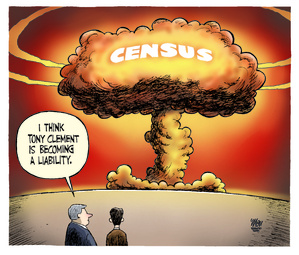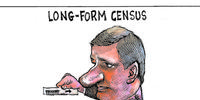I am really excited to get information about Canada’s National Statistical Council. Up and until recently all I knew about it was these 2 lines found in the deep lurkium about us section of the Statistics Canada Website.
Some time ago I called the StatCan general information line on numerous occasions, and asked officials about it. All to no avail. So I eventually submitted an ATIP request that StatCan has been working on for 2+ months. I still do not have the documents. For some reason, the work of this Council is secret, as is its membership, as is what they are about. I did however find some great papers that were submitted to it in the StatCan library. The Library is a wonderful source of information as are their knowledgeable librarians. Alas, they have come out of the closet as a result of this censuslessness.
If StatCan were more obvious with what it does and communicated its work more obviously, much of this whole censuslessness would have been much easier to counter. For instance, other government agencies publish the legislation that govern them and/or mandates what they do. StatCan does not have that information on their site.
In addition, all the justification about the questions they ask on the Census, how those questions came about, their public consultations are also available. However one has to know the Agency really well to know where to find these, such as the names of the reports, and which sections of that report and so on.
Eccetera
Here is information about the National Statistical Council of Canada:
Council Role — Overview
The National Statistics Council advises the Chief Statistician of Canada on the full range of Statistics Canada’s activities, particularly on overall priorities. The government appoints Council members and its approximately 40 volunteer members represent sophisticated and diverse data users, researchers and those whose experience enables them to advise on priorities for the country’s statistical system.
A longer description, taken from the United Nation’s description of the Canadian statistical system, is included as another attachment (National Statistics Background.doc and here).
For those who may want to discuss statistical advisory bodies like the Statistics Council and, more generally, the relation between statistical agencies and governments, this is the subject of current research by Prof. Cosmo Howard in the Political Science department of the University of Victoria. howardc at uvic dot ca and has agreed to serve as a media contact on that subject.
It should be noted that Professor Howard is not associated with the Council, nor does he speak for it. He is, however, an expert on bodies like the National Statistics Council.
Also, here is a document that speaks about the Council in more detail:
Establishment of the National Statistics Council
In the early 1980s Statistics Canada embarked on a conscious program of strengthening its active consultative mechanisms with key clients and broadly based representatives of the national interest. Among the major new initiatives were the establishment of a series of bilateral senior committees with key federal departments – both clients and sources of data derived from administrative records (this supplemented already existing strong consultative mechanisms with the provinces); and some 10-15 professional advisory committees were set up. The latter involved experts (typically from outside government) in such areas as demography, labour, national accounting, price measurement, service industries, etc.
In 1985, the government established, at the apex of the Agency’s consultative mechanisms, the National Statistics Council. Its formal mandate is very brief: it is to “advise the Chief Statistician in setting priorities and rationalizing Statistics Canada programs”. In line with other aspects of Canadian policy in relation to statistical activities, a careful balance was attempted between policy relevance and professional independence.
Appointment process and membership
Members of the Council are appointed for a period of three years but subject to renewal. There are about 40 members. While there are no rules for representation, the following practice has generally been adhered to:
1. All members serve in their individual capacities – there are no formal representational appointments;
2. Most members are interested and prestigious analysts of some aspect of Canadian life, but few are professional statisticians;
3. Some members from Statistics Canada’s various professional advisory committees serve on the Council. This ensures the availability of a wide range of subject matter knowledge within the Council, as well as linkage with the Agency’s other advisory bodies;
4. A senior member from the Statistical Society of Canada sometimes serves;
5. At least one senior journalist on social or economic affairs is a member;
6. Membership is selected in such a fashion as to ensure appropriate knowledge of the different provinces and territories of Canada ;
7. No federal official is a member of the Council. This enhances the de facto independence of Council to “speak up” should it be necessary;
8. The Chief Statistician is an ex officio member;
9. An Assistant Chief Statistician serves as secretary.
A large proportion of the initial members, were appointed by the Minister from a list of persons recommended by the Chief Statistician. Subsequent appointments have been proposed to the Minister by the Chief Statistician following discussions with the Chairman of the Council.
As a result of these measures, the Council is a very knowledgeable, influential and broadly representative group. Indeed, its influence derives from the individual prestige of its members.
Agenda and Modus Operandi
The Council normally meets twice a year, each time for a day and a half. Regular agenda items are “Statements by Members” in which Council members may raise questions or concerns either for immediate response or subsequent discussion, and an in-depth report by the Chief Statistician on recent developments at Statistics Canada (including new substantive initiatives, forward planning, budgetary expectations). Other agenda items usually deal with major statistical or policy issues – such as: Census content, Environment statistics, Longitudinal data, Issues in social statistics, National accounts, Dissemination practices, Pricing policy, Privacy and record linkage, Contingency planning in the face of expected budget cuts, the Provincial component of the national statistical system, Significant statistical information gaps, etc.
Agenda items are selected from items raised by members and issues identified by Statistics Canada in discussions with the Chairman. From time to time a subgroup of the Council is formed to deal with particular issues (e.g. access to historical censuses) between Council meetings.
The Council generally provides feedback to the Chief Statistician through a discussion among its members. Consensus is usually (though not always) achieved.
Conclusion
There can be no doubt that members of the Council take their function seriously. The Chief Statistician regards their advice as being of very substantial benefit. In addition, through the prestige of its members and through precedent, Council has evolved into an additional and – should the need arise undoubtedly very influential – bulwark in the defence of the objectivity, integrity and long-term soundness of Canada’s national statistical system.
![CountingForNothing What Men Value and What Women are Worth [Paperback]](https://www.datalibre.ca/wp-content/uploads/2010/08/CountingForNothing.jpg)




Comments on Posts